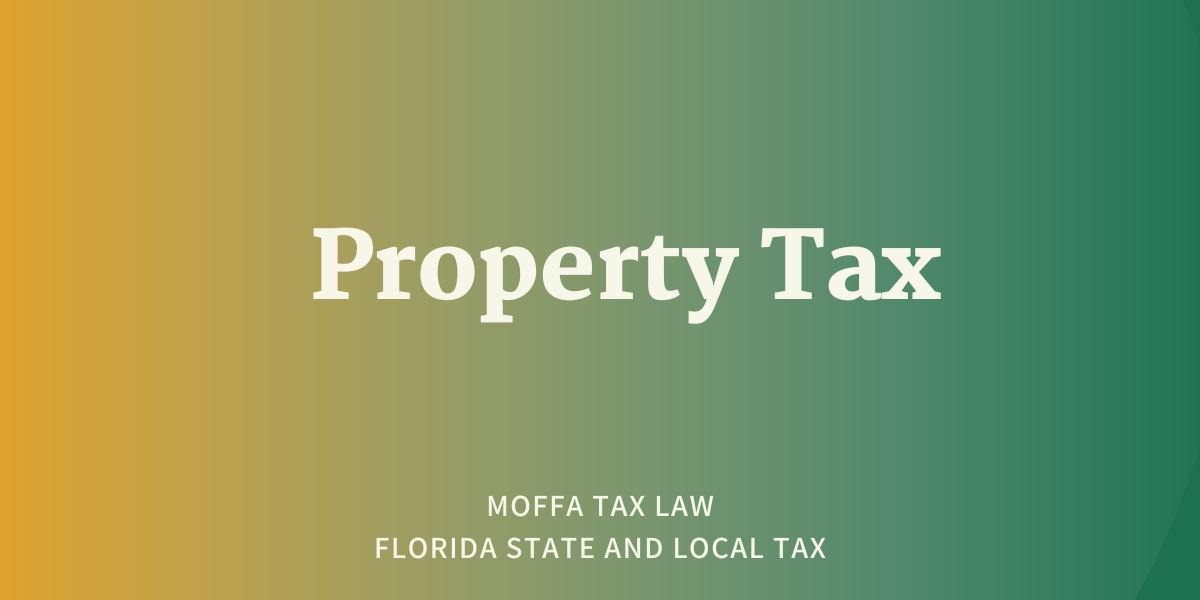NEWS & INSIGHTS


On April 21, 2025, the U.S. Supreme Court denied certiorari in Turner v. Jordan, a case that challenged whether a Florida county’s tax deed sale, conducted without distributing the surplus value of a homestead property, amounted to an unconstitutional taking under the Fifth Amendment. The Court’s decision leaves in place the Eleventh Circuit’s ruling, which dismissed the case on comity grounds—a federal abstention doctrine that precludes federal interference with state tax matters.
The case captured national attention following the Supreme Court’s 2023 decision in Tyler v. Hennepin County, where the Court unanimously held that a Minnesota county violated the Takings Clause by retaining surplus equity from a tax sale. Turner’s legal team argued that Tyler controlled, and that federal courts should not abstain when the plaintiff merely seeks return of surplus funds—not a declaration invalidating a state tax.
Yet, the Eleventh Circuit disagreed. The appellate court emphasized that Turner’s complaint focused on the administration of Florida’s tax deed process—specifically, whether his property retained its homestead status at the time of sale—not on the retention of a surplus.
Background: The Florida Tax Deed Sale Process
Under Florida law, property taxes are assessed annually on January 1. If taxes remain unpaid by April 1, a lien attaches to the property, and the county tax collector may issue a tax certificate to collect the debt. After two years, the certificate holder may apply for a tax deed, triggering a public auction. The statutes governing this process are extensive and highly procedural:
Fla. Stat. § 197.432 provides for the issuance of tax certificates.
Fla. Stat. § 197.502 initiates the tax deed application process.
Fla. Stat. § 197.502(6)(c) mandates that the opening bid on homestead property must include the amount needed to satisfy the tax debt plus one-half the assessed value of the property.
Fla. Stat. § 197.582 governs the distribution of surplus proceeds from the sale. If surplus exists, it must be paid first to satisfy liens and then to the former property owner.
In Turner’s case, the County sold his property from the “lands available for taxes” list, not via public auction. The final sale price equaled only the back taxes owed—$3,540.45—despite the property’s assessed value of approximately $30,595. Turner received none of the surplus he claimed was rightfully his under Florida law.
The Legal Dispute: Constitutional Takings or State Tax Procedure?
Turner’s central argument was that the County failed to follow Florida law by selling the property without applying the required homestead minimum bid calculation. He argued that this resulted in the government’s failure to collect the full fair value of the property and thus denied him a surplus to which he was entitled. He sued under 42 U.S.C. § 1983, alleging a Fifth Amendment taking.
The core issue was whether federal courts could hear his claim or whether the case was barred under the comity doctrine, a federal abstention principle that defers to state courts in matters involving local taxation.
The comity doctrine was first applied to state tax cases in Fair Assessment in Real Estate Association v. McNary, 454 U.S. 100 (1981), and reaffirmed in Levin v. Commerce Energy, Inc., 560 U.S. 413 (2010). These cases establish that federal courts should avoid interfering in state tax systems where state courts offer “plain, adequate, and complete” remedies and where federal litigation would disrupt tax administration.
The Eleventh Circuit, relying on this precedent, held that Turner’s challenge fell squarely within comity’s scope. The court reasoned that Turner’s claim was not simply about surplus value, but rather a challenge to the mechanics of the tax sale itself—specifically, whether his property retained homestead status at the time of sale.
Petitioner’s Argument: Tyler Changes Everything
Turner, represented by Robins Kaplan LLP, argued that the Supreme Court’s 2023 decision in Tyler v. Hennepin County, 598 U.S. 631 (2023), should have compelled a different result. In Tyler, the Court held that when a government sells property to satisfy a tax debt and retains the surplus, it violates the Takings Clause of the Fifth Amendment.
Turner contended that:
His claim involved the government’s failure to remit surplus equity, which Tyler established is not part of the tax itself.
Therefore, comity does not apply, as his claim does not seek to interfere with tax assessment, collection, or enforcement.
The Eleventh Circuit created a circuit split by applying comity in a situation where other circuits (including the Second and Sixth) had declined to do so.
Notably, both the Second Circuit in Dorce v. City of New York, 2 F.4th 82 (2d Cir. 2021), and the Sixth Circuit in Freed v. Thomas, 976 F.3d 729 (6th Cir. 2020), had held that surplus value claims do not implicate state tax administration and thus may proceed in federal court.
Turner asserted that his suit—unlike tax refund or assessment challenges—did not require invalidating any tax, and thus did not threaten state autonomy in taxation.
Respondents’ Position: Florida Law Was Followed
The respondents, including Suwannee County Tax Collector Sharon Jordan and other local officials, argued that:
The property was not homestead at the time of sale, a conclusion supported by Florida law and administrative practice.
Therefore, the County correctly calculated the opening bid at the amount of back taxes owed.
Turner’s lawsuit necessarily challenged the application of state tax law and the discretion of state officials, thus falling within the reach of comity doctrine and properly barred from federal court.
Florida courts provided a plain and adequate remedy: Turner could have pursued a claim under Florida’s statutory procedures to void the tax deed or to recover any improperly withheld surplus.
The Eleventh Circuit agreed, concluding that because the complaint “would require a federal court to interpret and possibly invalidate how Florida officials apply and administer state tax law,” abstention was appropriate.
A Dissent and a Circuit Split
Judge Kevin Newsom dissented from the Eleventh Circuit’s decision. He argued that the majority misapplied the Levin factors and ignored Tyler‘s central holding. According to Newsom, Turner’s claim was not disruptive to Florida’s tax administration—it was about enforcing a constitutional right to property after the tax was already collected.
This dissent aligned with reasoning in Freed, Harrison, and Dorce, where federal courts permitted § 1983 claims for takings of surplus equity. The result is a clear circuit split over whether such claims must be relegated to state court.
Petition for Certiorari and Response Brief
After the Eleventh Circuit affirmed the dismissal of Turner’s federal takings claim, Turner filed a petition for a writ of certiorari with the U.S. Supreme Court on January 15, 2025 (No. 24-765). His petition argued that the Eleventh Circuit’s decision deepened an existing circuit split on whether comity abstention applies to surplus-value takings claims and misapplied the Supreme Court’s holding in Tyler v. Hennepin County.
In response, Suwannee County Tax Collector Sharon Jordan, represented by Coppins Monroe, P.A., filed a Brief in Opposition. The County maintained that comity clearly applied because Turner’s suit challenged the administration of state tax law—not merely the retention of surplus value. They emphasized that Florida law provided adequate remedies and that Turner’s interpretation of Tyler stretched the ruling beyond its context.
The stage was set for the Supreme Court to potentially resolve the national circuit split on tax foreclosure surplus takings. However, the Court declined to take the case.
Implications and Conclusion
The Supreme Court’s refusal to resolve this circuit split leaves significant uncertainty for property owners seeking redress after tax foreclosure sales, especially in the Eleventh Circuit (covering Florida, Georgia, and Alabama). Key takeaways include:
Florida property owners may be barred from federal court, even when raising constitutional claims under § 1983, if their case implicates tax collection procedures.
Circuit splits remain unresolved, particularly on whether surplus value is distinct enough from the tax to avoid comity abstention.
The Tyler decision may still have untapped force, but its boundaries are unclear post-Turner.
State court remedies, while technically available, may not always offer meaningful recovery—especially in cases involving complicated administrative interpretations or constitutional questions.
For legal practitioners, the case is a cautionary tale: even strong constitutional claims may be sidelined in federal court if they touch on how a state collects and administers taxes.
The matter of tax foreclosure takings remains legally unsettled—and ripe for future Supreme Court clarification.
© 2025 Jeanette Moffa. All Rights Reserved.
Share
Additional Articles by the SALTy Orange at Moffa Tax Law:
NEWS & INSIGHTS State Conformity with the BBA Partnership Audit Rules: Where Are We in 2025? State Conformity with the…
How Florida’s Sales Tax Auditors Target Convenience Stores (and What You Can Do About It)”
NEWS & INSIGHTS How Florida’s Sales Tax Auditors Target Convenience Stores (and What You Can Do About It) Florida Department…
NEWS & INSIGHTS Florida Sales Tax Guide for Convenience Stores: What Every C-Store Owner Must Know Convenience stores are a…

Jeanette Moffa, Esq.
(954) 800-4138
JeanetteMoffa@MoffaTaxLaw.com
Jeanette Moffa is a Partner in the Fort Lauderdale office of Moffa, Sutton, & Donnini. She focuses her practice in Florida state and local tax. Jeanette provides SALT planning and consulting as part of her practice, addressing issues such as nexus and taxability, including exemptions, inclusions, and exclusions of transactions from the tax base. In addition, she handles tax controversy, working with state and local agencies in resolution of assessment and refund cases. She also litigates state and local tax and administrative law issues.


